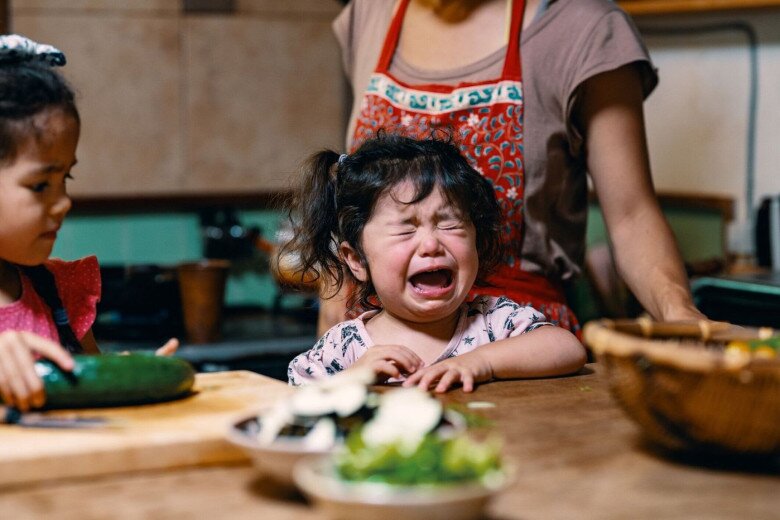Since young children often lack fully developed cognitive and emotional expression abilities, they may resort to hitting as a way to communicate their frustration or seek attention and comfort from their parents. While this behavior can be attention-seeking, it’s important to understand the underlying causes and respond appropriately to promote healthy emotional development.

Illustration photo.
Hitting can be a child’s way of expressing disappointment or seeking attention and comfort from their parents. While it may stem from anger or a sense of helplessness, it doesn’t always carry a negative connotation.
However, this behavior can also create tension in the parent-child relationship. Parents may feel exhausted, anxious, and unsure of how to handle the situation. If not addressed properly, it can lead to conflicts and distance between parents and children.
This behavior also presents challenges in parenting and family dynamics, requiring thoughtful approaches to discipline and education. Understanding the underlying causes is essential for an appropriate response, fostering healthier character and psychological development in children.

Scenario: A mother takes her child to play with her two cousins, but when it’s time to leave, the child refuses and hits the mother, vandalizing property in public.

The mother, surprised by her usually well-behaved child’s sudden outburst, wonders if the child feels less loved than her cousins. She seeks expert advice on the primary cause and any other potential triggers for such behavior.
In this scenario, it’s essential to consider the child’s daily life and the dynamics between the mother, child, and cousins. The child may feel that the mother treats her cousins more favorably, leading to feelings of being less loved.
Additionally, there could be other underlying causes. First, the child may deliberately act out, knowing that the mother won’t discipline her in front of others. Second, the mother’s timing of leaving the play session could be perceived as a disruptive or upsetting event, interrupting the child’s happiness.
There are three main reasons for the child’s outburst, and it’s possible that the child has exhibited similar behavior in the past, but the parents didn’t recognize or address it effectively. This time, the situation escalated, taking the parents by surprise.

How should the mother handle this situation? Is it appropriate to use harsh discipline or physical punishment in response to the child’s behavior?
While the child’s behavior of hitting the mother is unacceptable, responding with physical punishment is not the solution. Discipline is necessary, but experts advise against using physical force as it can be detrimental to the child’s development and well-being.
Instead, it’s crucial to understand the underlying causes of the child’s behavior. The mother should aim to calm the child using various techniques suited to the child’s personality. Ideally, temporarily separating the child from the family and cousins could help diffuse the situation. Maintaining eye contact and assuring the child of her presence can also be comforting.
Once the child is calm, the mother should help the child process what happened by describing and discussing the incident. Asking questions like, “Why did you react that way?” or “How are you feeling now?” can help the child reflect on their actions. Understanding the child’s motivations is essential before deciding on an appropriate punishment, which should be tailored to the child’s age and response during their conversation.

What’s the best way to restore calm and positive emotions for both the child and the mother after such a stressful event?
Both the child and the mother are likely to feel stressed after such an incident. While the focus is often on the child’s emotions, it’s important to acknowledge the mother’s feelings as well. Here are some steps she can take to restore calm:
First, deep breathing exercises can help the mother regain composure. Reminding herself that the event has already occurred and focusing on helping her child manage their emotions can shift her mindset away from frustration.
Once the mother has calmed down, her serene and caring presence will positively influence the child’s ability to regulate their emotions.

Are there methods to help children recognize their emotions and express them in a more positive way?
There are various methods to help children recognize and manage their emotions, depending on the family’s educational approach. Here are some psychological strategies to consider:
1. Rewards: When children learn to regulate their emotions effectively, it’s essential to encourage and reinforce this behavior through praise or small gifts.
2. Discipline: Discipline should be used to help children modify and curb negative behaviors. It’s crucial to determine appropriate disciplinary actions that align with the family’s values and the child’s needs.
However, if discipline is not applied correctly, children may become fearful of punishment rather than understanding the consequences of their actions. Some disciplinary actions, like scolding a child in public or taking away a beloved toy, may not be constructive. It’s essential for parents to discuss and choose disciplinary actions that best suit their child’s needs, fostering positive behavioral changes.





































